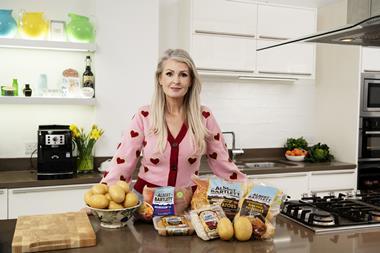
National Food Strategy author Henry Dimbleby has accused food industry bosses of deliberately exploiting the cost of living crisis to persuade ministers to water down his plans for legislation to tackle obesity and environmental harm caused by food production.
Speaking to The Grocer after the government published its response to his landmark report, six months later than promised, the Leon restaurant founder said the plans amounted to “not a strategy but a list of policies”. He said it would fail to have a major impact on the obesity crisis unless the government was prepared to bring in regulation.
While the government response backed elements of his report, it snubbed key proposals, including a tax on products high in salt and sugar, free fruit & veg to children suffering food poverty and an expansion of free school meals.
With Dimbleby having been brought in by former environmental secretary Michael Gove to draw up proposals on the environment and obesity, ministers shelved most of the key proposals on health, saying they would instead be addressed in moves by health secretary Sajid Javid.
The government also rejected Dimbleby’ s plans for greater environmental and welfare standards in farming, a 30% reduction in meat and dairy consumption and his calls for trade deals to include measures to protect the UK from cheaper, poorer-quality imports.
Dimbleby said the response was reflective of the government having “no joined-up strategy” about how to tackle the damage to health and the environment caused by food production and the marketing of junk food.
And he said he believed fierce lobbying from the industry had resulted in many of his main proposals being ignored.
“People are using the cost of living crisis to try to protect their vested interests,” Dimbleby told The Grocer today.
“If you look at how the government is being lobbied now, the way in which the cost of living crisis is being used to stall progress – people argue that we need to make more junk food available.
“Take bodies like the FDF. If you look at its CEO Karen Betts’ job, it’s to try and slow down any regulation.
“The food sector is as stuck in the junk food cycle as we are as a nation. It is a fact that it’s easier to sell food that hurts us than it is to sell food that doesn’t hurt us.
“Therefore, far more money goes into marketing and producing that food.
“It is impossible to stop that happening without government regulation.”
Dimbleby welcomed elements of today’s government announcement, including plans to publish a framework for land use in England next year. He also welcomed a commitment that by the end of 2023 the government would streamline all reporting requirements for the sale of food and drink, including mandatory reporting on metrics for health and “possibly” sustainability and animal welfare.
He claimed his report had manged to “change the narrative” by getting ministers to agree that the UK was stuck in a “junk food cycle”.
But he said the government needed to do “much more” if that was to result in a reversal of the crisis.
The government claimed its plans, including incentives for industry and investment in research, would support farmers to harness innovation to boost home-grown fruit & vegetable production, and create new job opportunities.
The strategy also stressed the need for protecting food security, in the wake of the Russian invasion of Ukraine.
Environment secretary George Eustice said: “The food industry is bigger than the automotive and aerospace industries combined, offering employment opportunities, apprenticeships and investment in research and development.
“The strategy we are setting out today will increase the focus on skills in the food sector, and the roles and career pathways available. We will seek to boost our horticulture industry and ensure the expertise needed to develop the sector here in the UK.”
FDF CEO Karen Betts said: “We welcome the UK government’s new food strategy, which is an endorsement of the success and centrality of the UK’s food industry, from farming to food manufacturing, retail and hospitality.
“With the right policy frameworks and the right support from government, our industry can provide unmatched support for levelling up, and benefit from growing exports while optimising imports. The government also has the industry’s support in developing ways to help people live healthier and more balanced lifestyles, and the industry’s Action on Fibre initiative and reformulation programmes are evidence of our support to date.”
She said there was “more the government can do”, included “helping our sector to invest in the technologies that drive productivity, particularly in a very tight labour market”.
Betts added: “The UK government must also work together with the devolved administrations to ensure that different policies affecting our sector don’t end up unnecessarily costing households more.”
The government’s food strategy proposals:
- £270m to be invested across farming innovation funding programmes by 2029, to unlock technologies to drive sustainable farming techniques and increase productivity
- Government to consult on ambition for 50% of public sector expenditure on food procurement to be on food either produced locally or to higher standards
- Measures to incentivise the sector to use surplus heat and CO2 from industrial processes, and renewable sources of energy to increase domestic horticultural production
- Review planning permission process to support new developments of glasshouses
- Launch an independent review to tackle labour shortages in the food supply chain, to look at the roles of automation, domestic labour, and migration to ensure UK businesses can access the labour they require
- Consult on how to improve on and expand animal welfare labelling, to help consumers identify when products meet or exceed our high UK animal welfare standards
- Extend seasonal worker visa route to poultry
- Publish a framework for land use in England next year
- Consult on food waste reporting for larger businesses over a certain size
- Publish a statement setting out requirements for those wishing to access the UK market to objectively demonstrate they deliver an equivalent level of health protection to UK
- Explore how to make the most of innovative feed additives that can reduce methane emissions from livestock
- Launch a new partnership between the public and private sector to provide consumers with more information about the food they eat while incentivising industry to produce healthier, more ethical, and sustainable goods
Source: Defra



















1 Readers' comment